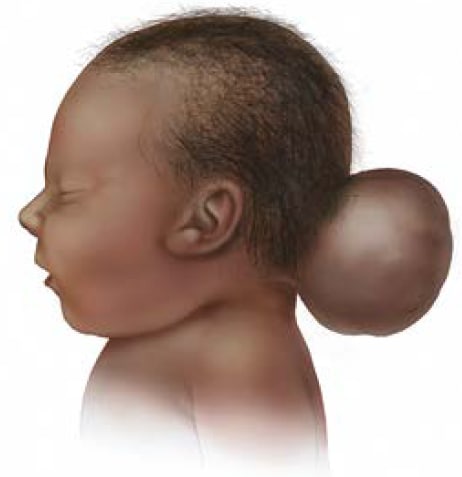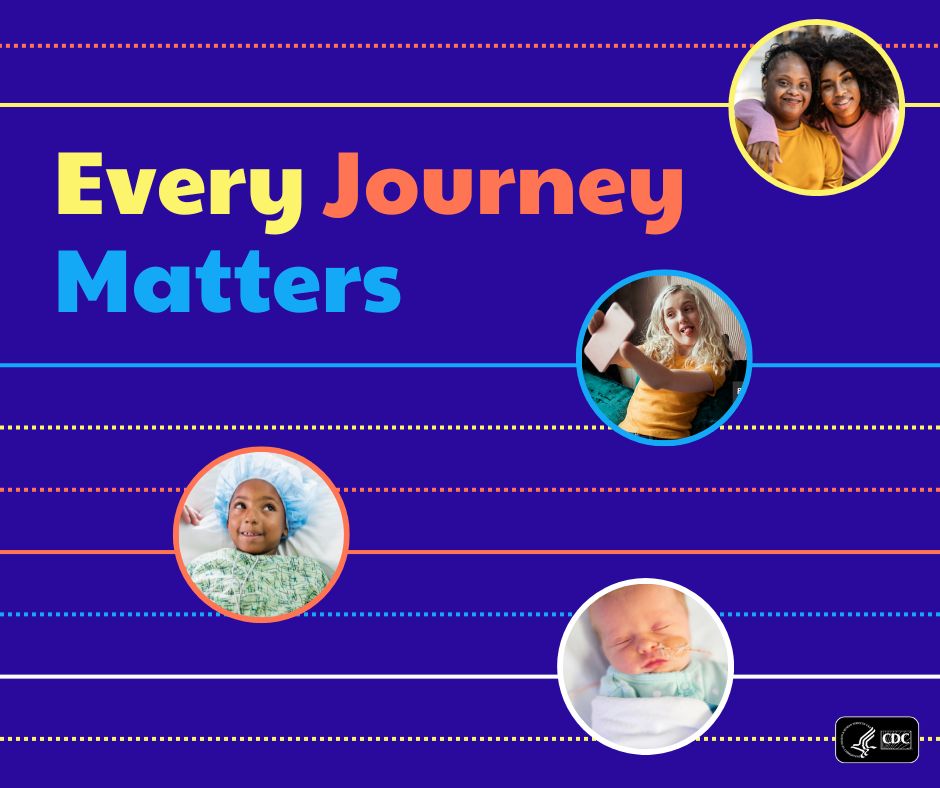Facts about Encephalocele
Encephalocele (pronounced en-sef-a-lo-seal) is a rare type of birth defect of the neural tube that affects the brain.
What is Encephalocele?
Encephalocele is a rare type of birth defect of the neural tube that affects the brain. The neural tube is a narrow channel that folds and closes during the third and fourth weeks of pregnancy to form the brain and spinal cord. Encephalocele is a sac-like protrusion or projection of the brain and the membranes that cover it through an opening in the skull. Encephalocele happens when the neural tube does not close completely during pregnancy. The result is an opening anywhere along the center of the skull from the nose to the back of the neck, but most often at the back of the head (pictured), at the top of the head, or between the forehead and the nose.
How Many Babies are Born with Encephalocele?
Researchers estimate that about 1 in every 10,500 babies is born with encephalocele in the United States.1
Causes
Although the exact cause of encephalocele is unknown, scientists believe that many factors are involved.
There is a genetic (inherited) component to the condition, meaning it often occurs in families that have family members with other defects of the neural tube: spina bifida and anencephaly. Some researchers also believe that certain environmental exposures before or during pregnancy might be causes, but more research is needed. CDC works with many other researchers to study factors that can
- Increase the risk of having a baby with encephalocele, or
- Impact the health outcomes of babies with encephalocele.
The following is an example of what CDC researchers have found:
- Several factors appear to lead to lower survival rates for infants with encephalocele, including preterm (early) birth, low birthweight, having multiple birth defects, or being black or African American.2,3
CDC continues to study birth defects, such as encephalocele, and how to prevent them. For example, taking 400 micrograms of the B vitamin, folic acid, every day before and during early pregnancy can help prevent some major birth defects of the baby’s brain and spine, such as encephalocele. If you are pregnant or thinking about becoming pregnant, talk with your doctor about ways to increase your chances of having a healthy baby.
Diagnosis
Usually encephaloceles are found right after birth, but sometimes a small encephalocele in the nose and forehead region can go undetected. An encephalocele at the back of the skull is more likely to cause nervous system problems, as well as other brain and face defects. Signs of encephalocele can include
- Buildup of too much fluid in the brain,
- Complete loss of strength in the arms and legs,
- An unusually small head,
- Uncoordinated use of muscles needed for movement, such as those involved in walking and reaching,
- Developmental delay,
- Intellectual disability,
- Vision problems,
- Delayed growth, and
- Seizures.
Treatment
Encephalocele is treated with surgery to place the protruding part of the brain and the membranes covering it back into the skull and close the opening in the skull. However, neurologic problems caused by the encephalocele will still be present. Long-term treatment depends on the child’s condition. Multiple surgeries may be needed, depending on the location of the encephalocele and the parts of the head and face that were affected by the encephalocele.
Resources for Families and Individuals Affected by Encephalocele
National Institute of Neurological Disorders and Stroke
National Organization for Rare Disorders
References
- Mai CT, Isenburg JL, Canfield MA, Meyer RE, Correa A, Alverson CJ, Lupo PJ, Riehle‐Colarusso T, Cho SJ, Aggarwal D, Kirby RS. National population‐based estimates for major birth defects, 2010–2014. Birth Defects Research. 2019; 111(18): 1420-1435.
- Wang Y, Liu G, Canfield MA, Mai CT, Gilboa SM, Meyer RE, Anderka M, Copeland
GE, Kucik JE, Nembhard WN, Kirby RS; National Birth Defects Prevention Network. Racial/ethnic differences in survival of United States children with birth defects: a population-based study. J Pediatr. 2015 Apr;166(4):819-26.e1-2. - Siffel C, Wong LC, Olney RS, Correa A. Survival of infants diagnosed with encephalocele in Atlanta, 1978-98. Paediatr Perinat Epidemiol. 2003;17:40-8.

